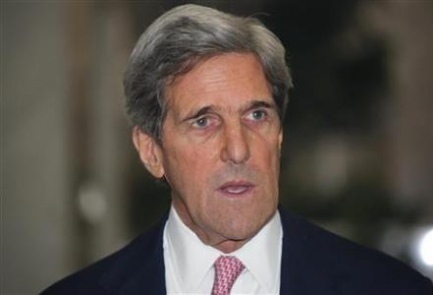Kerry pleased with Syria chemical disarmament
U.S. Secretary of State John Kerry goes as far as to praise Syrian President Bashar Assad “for complying rapidly as they are supposed to” • Even without his chemical weapons arsenal, Assad’s air power and better-equipped ground forces would still hold a significant advantage over the rebels.
International experts began overseeing the destruction of Syria’s chemical weapons arsenal on Sunday, according to an official from the mission, which has averted a U.S. strike and could rob Syrian President Bashar Assad of his most feared weapons.
The operation is being conducted amid a civil war in which 120,000 people have been killed, fragmenting Syria along sectarian and ethnic lines and drawing in Iran and Hezbollah on the side of Assad and his Alawite minority and Arab Sunni powers on the side of the mostly Sunni Muslim rebels.
The official, a member of a joint team from the Organization for the Prohibition of Chemical Weapons in The Hague and the U.N., said Syrian forces were using cutting torches and angle grinders to begin “destroying munitions such as missile warheads and aerial bombs and disabling mobile and static mixing and filling units.”
“Let it be clear that it is the Syrians who do the actual destroying while we monitor, observe, verify and report,” he said.
Witnesses said the experts, who arrived on Tuesday, left their Damascus hotel in the early hours of Sunday to begin their work in an undisclosed location.
U.S. Secretary of State John Kerry said Monday the U.S. and Russia were “very pleased” with the progress being made so far in destroying Syria’s chemical weapons stocks. And, he offered some rare, if qualified, U.S. praise for Assad, saying the Assad regime deserved credit for its speedy compliance with the U.N. Security Council resolution calling for the elimination of the weapons. However, Kerry stressed that Assad was not off the hook yet and needed to continue to comply with U.N. demands.
“Let me be crystal clear. We’re very pleased with the pace of what has happened with respect to chemical weapons,” Kerry said, speaking at a press conference with Russian Foreign Minister Sergey Lavrov.
Kerry noted that on Sunday, just over a week after the Security Council and the international chemical weapons watchdog acted, experts had started the process of destroying the stockpiles.
“I think that was a terrific example of global cooperation, of multilateral efforts to accomplish an accepted goal and they have moved with equal speed to get on the ground in Syrian and begin the operations,” he said.
“I think it is also credit to the Assad regime for complying rapidly as they are supposed to. We hope that will continue. Now, I am not going to vouch today for what happens months down the road. But it is a good beginning and we should welcome a good beginning.”
The mission, which the U.S. hammered out with Russia after the Aug. 21 chemical weapons attack in Damascus prompted U.S. threats of air strikes against Assad’s forces, is expected to continue until at least mid-2014.
Even without his chemical weapons arsenal, Assad’s air power and better-equipped ground forces would still hold a significant advantage over the rebels, who remain divided, with large numbers joining hard-line Islamist brigades.
On the ground, the war has largely settled into a stalemate, with Assad seeking to tighten his grip on the center of the country, the coast, areas along the country’s main north-south highway, routes to Lebanon and Iraq, and Damascus.
Assad’s government and the rebels blame each other for the Aug. 21 sarin nerve gas attack in Sunni Muslim suburbs of the capital that killed hundreds of people.
The U.S. and other Western countries say a report by U.N. investigators indirectly implicates government-allied forces for the attack.
The U.N. Security Council adopted a resolution last week that demands the eradication of Syria’s chemical weapons and endorses a plan for a political transition in Syria.
The West is pushing, along with Russia, for the convening of a conference to nudge Assad and his foes towards a settlement to the conflict, the bloodiest of the “Arab Spring” revolts against entrenched autocrats.
But Assad told a German magazine he would not negotiate with rebels until they laid down their arms, and said Russia, his most powerful ally, supported his government more than ever.
He said he did not believe it was possible to solve the conflict through negotiations with the rebels.


